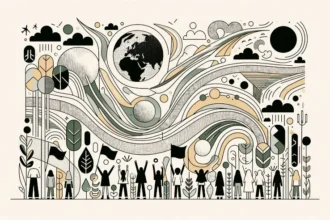In an era where technology redefines boundaries, digital human rights emerge as a pivotal concept. Over the last century, the evolution of human rights has journeyed from parchment to pixels, confronting new challenges in the digital world. This realm, once heralded as a beacon of liberty and a safeguard of rights, is witnessing a concerning regression. The initial promise of a digital utopia, where autonomy, empathy, and dignity flourished, is now overshadowed by technological advancements that, paradoxically, erode these very principles.
The erosion of digital human rights in cyberspace marks a significant shift from the original vision of digital spaces as enhancers of freedom and empowerment. Instead, these advancements have morphed into tools compromising the essence of human rights. This article delves into this paradox, focusing on how digital human rights are being undermined, particularly examining the decline of autonomy, empathy, and dignity in the digital landscape.
As we navigate this digital labyrinth, the conversation about digital human rights becomes more crucial. The early dreams of a utopian digital world, championing human dignity and freedom, starkly contrast with the current reality, where technology challenges the core values of human existence.
Constructing Conventional Human Rights
The genesis of human rights is intricately woven into the fabric of societal evolution, deeply rooted in the concepts of autonomy and empathy. This journey, transforming abstract ideas into concrete legal structures, showcases a complex tapestry of human progress. Throughout history, the path towards recognizing and enforcing human rights has been fraught with uneven applications and significant exclusions, reflecting the diverse and often conflicting facets of human nature and governance.
The principles of autonomy and empathy, long-standing pillars of human rights, face new challenges and interpretations.
The inception of human rights norms was significantly influenced by philosophical, cultural, and legal milestones. Key moments like the adoption of the Universal Declaration of Human Rights (UDHR) symbolized a turning point in the global acknowledgment of these rights. However, the enforcement of such conventions often remained within the purview of state mechanisms, creating an inherent paradox. The entities responsible for upholding human rights were, in many instances, the very ones violating them. This contradiction highlights a critical challenge in the realm of human rights – the delicate balance between sovereign state authority and the universal nature of human rights.
As the world transitioned into the digital era, this paradox became even more pronounced. Digital human rights, while intrinsically connected to conventional human rights, brought forth unique challenges and opportunities. The digital space, unconstrained by physical borders and traditional governance structures, opened new avenues for both the protection and violation of human rights. The autonomy and empathy foundational to human rights found new expressions and vulnerabilities in the digital context.
The evolution of digital human rights has been a testament to the adaptability and resilience of the human rights framework. From the early days of the internet, envisioned as a tool for global connectivity and empowerment, to the current landscape where digital platforms can both champion and challenge human rights, the journey has been transformative. The digital realm has redefined the parameters of privacy, freedom of expression, and access to information, pushing the boundaries of what constitutes human rights in a connected world.
As we delve deeper into the digital age, understanding and safeguarding digital human rights becomes increasingly vital. The lessons learned from the construction of conventional human rights provide a valuable foundation, but the digital world demands a nuanced and forward-looking approach. In this ever-evolving landscape, our commitment to upholding and advancing digital human rights will shape not only the virtual world but also the very essence of our human experience.
The Digital Transformation of Human Rights
The advent of digital technology has brought about a transformative shift in the landscape of human rights. As societies globally navigate through the digital age, the concept of digital human rights has become increasingly relevant and complex. This era, characterized by rapid technological advancements, has reshaped the understanding and implementation of traditional human rights in the context of digital spaces.
Individuals are no longer merely users of digital platforms but become integral components of vast data ecosystems.
In this digital age, the principles of autonomy and empathy, long-standing pillars of human rights, face new challenges and interpretations. The ubiquity of digital platforms and the pervasive nature of online communication have redefined the way individuals interact with each other and with institutions. This transformation has not only expanded the scope of human rights but has also introduced novel vulnerabilities and threats. The protection of privacy, freedom of expression, and access to information — core elements of digital human rights — are constantly being tested in the face of evolving digital technologies.
The protection and enforcement of digital human rights require an understanding that extends beyond traditional frameworks. As digital spaces become integral to daily life, issues such as data privacy, cyber surveillance, and digital censorship emerge as critical concerns. These concerns highlight the need for a nuanced approach to digital human rights, one that comprehends the intricate relationship between technology, individual rights, and societal norms.
Moreover, the digital world has democratized the access to information and platforms for advocacy, offering unprecedented opportunities for promoting and protecting human rights. Activists, organizations, and ordinary citizens now harness the power of digital tools to mobilize support, expose injustices, and hold authorities accountable. However, this empowerment comes with the responsibility to navigate the complex ethical and legal landscape of the digital world.
As we continue to witness the evolution of digital human rights, the role of international bodies, governments, corporations, and civil society in shaping this landscape cannot be overstated. Collaborative efforts are essential in ensuring that the digital world remains a space where human rights are respected and protected. The journey towards achieving this balance is ongoing, and the decisions made today will have lasting implications for the future of digital human rights.
Regression of Digital Human Rights
The digital era, marked by its relentless data collection and sophisticated algorithmic manipulation, poses significant threats to the sanctity of digital human rights. As we delve deeper into this technological epoch, we witness an alarming trend: the erosion of individual autonomy and the reshaping of human behavior and perceptions, driven by the invisible hands of data-driven algorithms. This regression of digital human rights reflects a disturbing pivot in the trajectory of technological progress, moving away from empowering human rights to serving market-centric objectives.
Passive data collection, a ubiquitous aspect of digital life, insidiously infringes upon individual privacy. Every digital footprint, whether actively given or passively captured, feeds into an ever-growing reservoir of personal data. This data, often harvested without explicit consent or awareness, forms the backbone of a surveillance architecture that continually monitors, tracks, and analyzes individual behaviors and preferences. The consequence is a profound compromise of privacy, a cornerstone of digital human rights, leading to a landscape where personal information is no longer private but a commodity for corporate and governmental interests.
Equally troubling is the role of algorithms in shaping societal norms and individual beliefs. Operating under a veneer of objectivity, these algorithms subtly influence users’ views and emotions, manipulating empathy and undermining the dignity of individuals. From curating social media feeds to personalizing news and advertisements, algorithmic bias and decision-making processes significantly impact public discourse and individual worldviews. This manipulation, often unnoticed, fundamentally alters the essence of free will and autonomy, central tenets of human rights in the digital realm.
This regression of digital human rights is not a standalone phenomenon but a symptom of a broader issue: the unchecked advancement of technology without parallel consideration for its human rights implications. As we advance further into the digital age, the challenge lies in reclaiming the narrative around digital human rights, ensuring that technological progress aligns with the preservation and promotion of fundamental human values. The path forward demands a concerted effort to integrate human rights considerations into the development and deployment of digital technologies, ensuring that these powerful tools serve to enhance, rather than diminish, our collective human dignity.
The Challenge at the Intersection of Data and Algorithms
At the crossroads of relentless data collection and sophisticated algorithmic manipulation lies a critical challenge for digital human rights. This convergence, a hallmark of the modern digital landscape, poses an unprecedented threat to the sanctity of individual rights and human dignity. In this complex interplay, individuals are no longer merely users of digital platforms but become integral components of vast data ecosystems, often reduced to mere data points in a sprawling digital control network.
The implications of this intersection are profound. Personal information, once considered private and protected, is now a valuable commodity in the digital marketplace. Every online interaction, every digital footprint, contributes to a vast pool of data that feeds into algorithms designed to predict, influence, and alter human behavior. This transformation of personal data into a tool for behavioral modification marks a significant departure from the principles of autonomy and privacy, fundamental to digital human rights.
Algorithms, often touted for their efficiency and neutrality, play a pivotal role in shaping this new reality. They are not just passive tools but active agents in decision-making processes that affect millions of lives. From determining what information individuals are exposed to online, to influencing purchasing decisions, to impacting social and political views, algorithms wield immense power. However, this power comes with a lack of transparency and accountability, raising critical questions about the protection of digital human rights in algorithm-driven systems.
The challenge, therefore, is twofold. First, there is a need for greater transparency and accountability in how data is collected, used, and shared. Second, there is an urgent requirement to embed human rights considerations into the design and deployment of algorithms. As we navigate this intersection, the goal must be to ensure that technological advancements, particularly in the realms of data and algorithms, do not come at the expense of fundamental human rights. Instead, they should be leveraged to support and enhance these rights, upholding the dignity and autonomy of individuals in an increasingly digital world.
The Need for a Rights-Based Discourse in Digital Spaces
The erosion of digital human rights in our technology-driven world presents a complex, multifaceted challenge that calls for a paradigm shift in how we perceive and protect these rights. Initiatives like the European Union’s General Data Protection Regulation (GDPR) mark significant steps towards safeguarding digital privacy and autonomy. However, the global and interconnected nature of the Internet, coupled with varying state interests and policies, often pushes the critical issue of digital human rights to the periphery.
To counter this regression, a robust, rights-based discourse must be elevated in digital spaces. This discourse should transcend the prevailing market-centric narratives and prioritize the protection of individual rights and dignity in the digital landscape. The focus needs to be on establishing a balanced digital ecosystem where technological advancements are harmoniously integrated with the fundamental principles of human rights.
Envisioning a digital utopia where rights are seamlessly protected may be idealistic, but the goal should remain clear: to prevent a dystopian future where technological progress overrides basic human rights. Striving for a digital world that respects and upholds human rights is not just an ideal; it is an imperative for ensuring a just, equitable, and humane future in an increasingly digital society.
Adapted from an academic article for a wider audience, under license CC BY 4.0














